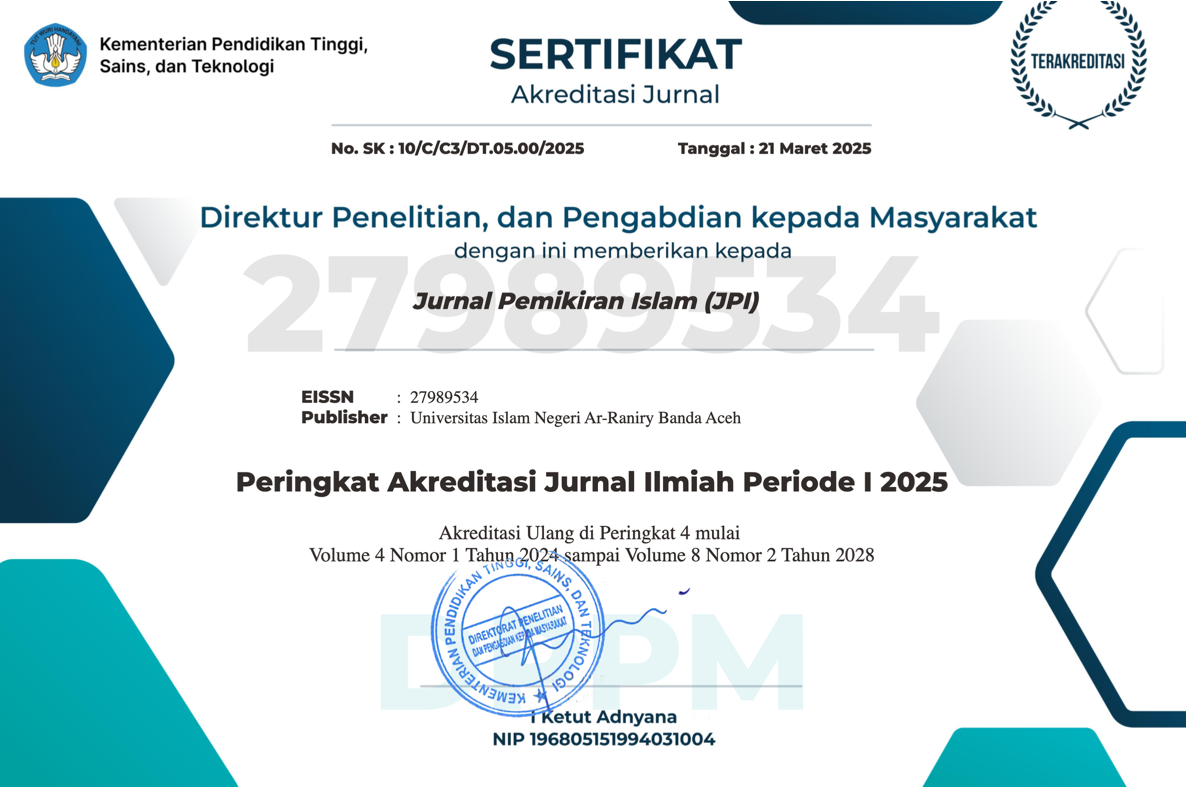Publication Ethics
Ethical Guidelines for Journal Publication
The publication of an article in the peer-reviewed Jurnal Pemikiran Islam (JPI) is an essential building block in the development of a coherent and respected network of knowledge. It reflects the quality of the authors’ work and the institutions that support them. Peer-reviewed articles support and embody the scientific method. Therefore, all parties involved in publishing — authors, editors, reviewers, the publisher, and the scholarly community — must agree on standards of expected ethical behavior. The Center for Research and Publication of UIN Ar-Raniry, as the publisher of JPI, takes its duties of guardianship over all stages of publishing seriously and is committed to ensuring that advertising, reprint, or other commercial revenue has no impact or influence on editorial decisions.
Duties of Editors
Publication decisions
The Editor-in-Chief is responsible for deciding which submitted articles should be published. The decision must always be based on the validity and importance of the work to researchers and readers and be guided by the editorial policies of the journal and applicable legal requirements regarding libel, copyright, and plagiarism. Editors may confer with other editors or reviewers in making decisions.
Fair play
Editors evaluate manuscripts for their intellectual content at all times without regard to the authors’ race, gender, sexual orientation, religious belief, ethnic origin, citizenship, or political philosophy.
Confidentiality
Editors and any editorial staff must not disclose any information about a submitted manuscript to anyone other than the corresponding author, reviewers, potential reviewers, other editorial advisers, and the publisher as appropriate.
Disclosure and conflicts of interest
Unpublished materials disclosed in a submitted manuscript must not be used in an editor’s own research without the express written consent of the author.
Duties of Reviewers
Contribution to editorial decisions
Peer review assists editors in making editorial decisions and may also assist authors in improving their papers through editorial communications.
Promptness
Any selected referee who feels unqualified to review the research reported in a manuscript or knows that a timely review will be impossible should notify the editor and withdraw from the review process.
Confidentiality
Manuscripts received for review must be treated as confidential documents and must not be shown to or discussed with others except as authorized by the editor.
Standards of objectivity
Reviews should be conducted objectively. Personal criticism of the author is inappropriate. Reviewers should express their views clearly with supporting arguments.
Acknowledgment of sources
Reviewers should identify relevant published work that has not been cited by the authors and should call to the editor’s attention any substantial similarity or overlap between the manuscript under consideration and any other published paper of which they have personal knowledge.
Disclosure and conflicts of interest
Privileged information or ideas obtained through peer review must be kept confidential and not used for personal advantage. Reviewers should not consider manuscripts in which they have conflicts of interest arising from competitive, collaborative, or other relationships or connections with any authors, companies, or institutions connected to the submission.
Duties of Authors
Reporting standards
Authors of original research must present an accurate account of the work performed and an objective discussion of its significance, with sufficient detail and references to permit others to replicate the work. Fraudulent or knowingly inaccurate statements constitute unethical behavior.
Originality and plagiarism
Authors must ensure that their works are entirely original. Where the work and words of others have been used, appropriate citation or quotation is required. JPI uses Turnitin to screen submissions and the similarity index for articles processed by the journal should not exceed twenty-five percent.
Multiple, redundant, or concurrent publication
Authors should not publish manuscripts describing essentially the same research in more than one journal or primary publication and should not submit the same manuscript to more than one journal concurrently.
Acknowledgment of sources
Proper acknowledgment of others’ work must always be given. Authors should cite publications that have influenced the nature of the reported work.
Authorship of the paper
Authorship should be limited to those who have made a significant contribution to the conception, design, execution, or interpretation of the study. All who have made significant contributions should be listed as co-authors. Others who have participated in certain substantive aspects should be acknowledged as contributors. The corresponding author must ensure that all appropriate co-authors are included and that all co-authors have seen and approved the final version and agreed to submit the manuscript.
Disclosure and conflicts of interest
All authors should disclose in their manuscript any financial or other substantive conflicts of interest that could influence the results or interpretation of the manuscript and should disclose all sources of financial support.
Fundamental errors in published works
When an author discovers a significant error or inaccuracy in their own published work, it is the author’s obligation to promptly notify the journal editor or publisher and to cooperate with the editor to retract or correct the paper.














